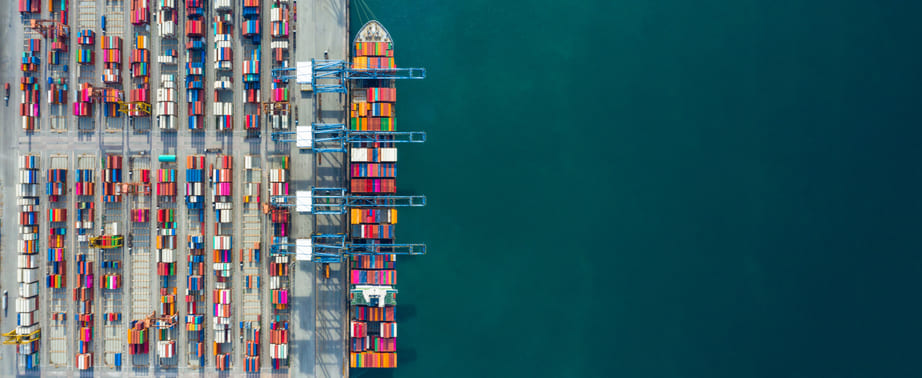Shipping shortages: What's causing the shipping crisis?
Wine, beer and spirits shipping is a global industry that relies on a complex supply chain of producers, logistics providers, distributors, and consumers. It’s an industry that relies heavily on ocean freight, to move beverages from one country to another. This also makes it vulnerable to delays when there is a change in supply and demand, or a geo-politcal event like the red sea attacks or global shipping crisis. These things can all result in container shipping shortages.
In this article, we uncover the causes of shipping shortages and delays, and how to overcome them.
What are the common causes of shipping shortages in international beverage shipping?
Shipping shortages can be caused by increased demand during peak seasons, macroeconomics, wars or even when demand grows more than expected in certain trade lanes and outstrips capacity. As a result, shippers need to reallocate capacity, which can cause shortages. Here are some common reasons for shipping shortages and tips on how to avoid them:
Weather conditions
Extreme weather conditions can cause shipment shortages too. For example, Argentinian wine shipments departing from Chilean ports (Valparaiso or San Antonio) can be delayed in winter if heavy snowfall blocks the crossing along the Andes mountain pass.
Equally, if there is a disruption along the transport route, causing a shipping delay, containers can spend more time than planned exposed to the elements. Wine and beer is particularly sensitive to the adverse effect that extreme temperatures and humidity can have on product quality of wine. Seasonal disruptions and fluctuations.
War and unrest
Events such as the Red Sea attacks can create a situation where shipping lines will announce blank sailings, resulting in tighter capacity and unreliable sailing schedules.
Seasonal demand
Holiday periods and major events can create an imbalance in the usual flow of worldwide containers, leading to delays and container shipping shortages. Seasonal periods are often a time of higher shipping demand and volumes too, which can also lead to container shipping shortages.
For example, during South Africa’s peak fruit shipping season containers are allocated primarily to the fruit trade, which can cause delays due to limited equipment availability. Similarly, China's Golden Week is a weeklong public holiday held annually, during which many businesses are closed, as the whole country celebrates.
Planning your shipments well in advance, especially during peak seasons, will help you overcome these bottlenecks. You could also consider using expedited shipping options if time is crucial, such as air freight.
Geopolitical Factors and Trade Barriers
Geopolitical factors can also contribute to shipping shortages, especially if they are in the form of tariffs or trade agreements. This is something the shipping industry experienced with China’s decision to impose hefty tariffs on Australian wine imports.
A combination of factors
Often, shipping shortages felt on a global scale are due to a combination of factors. The shortages of many products experienced in early 2020, for example, was caused by the pandemic, which paved the way for a transition to e-commerce shopping, and increased the demand for goods from China. This, in turn, resulted in a supply and demand imbalance, with many containers ending up bottlenecked outside US ports. These combined factors lead to inland supply chain disruptions and a global shipping container shortage, disrupting trade worldwide.
How to avoid shipping shortages?
While it's not possible to completely remove the possibility of shipping shortages, it is possible to minimize the risk. You can do this by planning ahead and understanding what’s happening with your trade lanes.
It is therefore essential to work with shipping partners with local knowledge and an office close to you. Equally, you can stay informed about the country-specific regulations and monitor global ports where your shipments may arrive at or depart from.
What causes shipping delays?
Many factors can lead to shipping delays, including:
Logistical Issues
Issues such as strikes, acts of war, or other unforeseen events can disrupt the normal flow of shipping. This will then cause shipping delays by disrupting the balance of the global container fleet.
Logistical problems anywhere along the supply chain can lead to shipping delays. For example, a winery might agree a ‘ready to ship’ date with an importer, but not be able to meet that date when the time comes. This may be due to production issues, shortages of packaging or other factors.
Planning ahead and choosing a reliable shipping partner with a track record of consistent service can help you avoid these delays. They can put contingency plans in place to help avoid shipping delays if an unexpected event occurs. In addition, maintaining clear communication with all parties involved in the shipping process is important for avoiding delays. Live tracking information and staying informed about any potential issues, can help resolve problems before they begin.
Regulatory compliance and documentation errors
Each country has specific regulations for the shipment of alcoholic beverages. This means you’ll need to know and provide the correct documentation, licences and certification at, to customs authorities. Failure to comply with these regulations can lead to shipping delays, additional charges, or even the return of your container.
To avoid running into problems, you must obtain all of the necessary permits, licences and documents before shipping. Research the legal requirements for shipping your products to their destination country, or speak to your local experienced logistics provider.
Customs inspections
All goods, including wines, beer and spirits, must go through the customs clearance process to enter or leave a country. Customs clearance is the process by which customs authorities inspect, verify, and approve the import or export of goods, ensuring compliance with applicable laws, regulations, and the payment of duties, taxes and tariffs.
Customs procedures can be time-consuming, and documentation errors may lead to delays. If your container is held by customs at the port, this can lead to additional costs in the form of demurrage and detention charges.
Demurrage is charged to shippers when a container is delayed inside a terminal whereas detention charges are imposed on containers delayed outside a terminal. You can incur detention charges, for example, if you don’t return your empty wine container within the free days period outlined in your freight tariff or charter party.
To avoid shipping delays and potential charges, ensure all required customs paperwork is correctly filled out. Work with experienced customs brokers or logistics providers, like Hillebrand Gori, who are familiar with the specific regulations of each destination country.
Why is timely shipping important for producers and consumers?
Supply chain disruptions can lead to containers taking more time to reach their destinations. Timely shipping is crucial for both producers, importers and consumers for several reasons, including:
- Securing sales: having the products your customers want to buy in stock avoids a loss in sales if they cannot find what they’re looking for, and take their business elsewhere.
- Preservation of wine and beer quality: delayed shipments can expose your beverages to longer periods where temperature and humidity can damage them. This will potentially affect the taste, aroma and quality of the product. To help protect the quality of wine or beer during transit, shippers can choose a specific type of container that will help safeguard the products.
- Reduced inventory costs: timely shipping helps importers to manage their inventory more efficiently. Minimizing the time goods spend in a warehouse reduces storage costs.
- Customer satisfaction: meeting or exceeding expected delivery times enhances the overall customer experience, generating positive reviews, repeat business, and customer loyalty.
Stay ahead of the curve to avoid delays
While you can't alter the weather, or predict unforeseen events, there are many strategies you can employ to minimize and manage the impact it has on your shipments.
An experienced shipping partner with specialist knowledge and, experience in beverage transportation, like Hillebrand Gori, can get your shipment to its destination in optimum condition and the shortest possible transit time.
Published 08th December 2020, updated 07 March 2024
A shipping shortage is a global shortage of shipping containers. This can disrupt international trade and cause problems for businesses and customers.
While there isn’t a complete solution for the problem of container shipping shortages, planning ahead, keeping up to date with your trade routes, and having a contingency plan can help. Less-than-container-load shipping, for example, can be useful in these situations, as it allows you to share a container with other shippers, making it easier to secure space.
A massive new tonnage deployment, coupled with a natural capacity increase thanks to increased schedule reliability, means capacity has overtaken demand growth. Capacity management is tighter as a result, and with disruptions from the Panama Canal traffic restrictions due to low water levels, and Suez tensions, changes to the shipping landscape look set to become a temporary norm.
How can we help your business grow?

.png?sfvrsn=c3460e9d_1)



